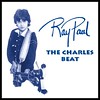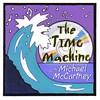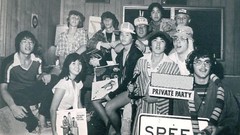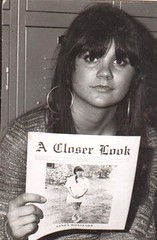This week, the L.A. Times is featuring a series of "point/counterpoint" exchanges (in the spirit of CBS "Sixty Minutes" in the late seventies) between RAIN publisher Kurt Hanson and SoundExchange and RAC board member Jay Rosenthal regarding numerous issues underscored by the CRB ruling, including the purpose and need for copyright, fair compensation to artists, and royalty structures that would allow the booming webcast industry to continue growing apace.
What follows are excerpts from both authors' articles. The articles are being featured in this week's "Dust Up" feature in the Opinion section of the paper. Excerpts from additional articles will follow later this week.
From the L.A. Times: "Today, Hanson and Rosenthal debate how and whether webcasting should be open to hobbyists, or only to those who can generate revenue for performers and labels...
How you learn to love musicBY KURT HANSON

"
Jay,
"For the past 70 years, broadcast radio has been the
primary means by which American consumers have discovered new music. For example, in my case, radio airplay is how I first discovered the Royal Guardsmen, Blood Sweat & Tears, the Fifth Dimension,... — artists I've subsequently purchased hundreds of dollars' worth of releases from.(Full disclosure: I actually only spent about $1.90 on the Royal Guardsmen; they lost me at "Snoopy's Christmas.") You could probably tell the same story about how you discovered music, too.

"
Even today, it's radio airplay that's the primary driver behind hit artists like Britney Spears, Maroon 5, and Akon. Radio airplay is the
lifeblood of the U.S. record business—and the primary driver behind its most profitable releases.
"
But one limitation of broadcast radio has always been its 'bandwidth.' There's only enough spectrum allocated to the FM band to squeeze in about 20 radio stations in a typical U.S. city, which means that there's only enough room for about the 20 most popular music formats — country, top 40, R&B hits, '60s oldies, smooth jazz, alternative rock, classic rock, adult contemporary, Christian contemporary, and so forth.
Musical genres that aren't one of the 20 or so most popular don't make the cut. Thus, in virutally all U.S. cities there isn't a full-time blues radio station, or mainstream jazz, or Broadway, or '50s oldies, or indie rock, or Celtic, or cabaret music, or electronica. And in fact, in most U.S. cities
there's no room for classical music, or pop standards, or singer-songwriters, or in some cases (e.g., New York City) even '60s oldies!
Satellite and Internet radio, fortunately, have come along to provide a solution to this problem of limited bandwidth for both the fans of these styles of music and the musicians and record labels who specialize in these genres.
In the cases of XM or Sirius, there's enough "bandwidth" on the satellites for about 60 music channels. Thus, pop standards, Broadway, and mainstream jazz make the cut... but Celtic, cabaret, and opera don't. The rules are the same as for FM; it's just that "20" has become "60."
"
In the special case of Internet radio, however, it's a whole new world, because 'bandwidth' is
essentially unlimited.
Thus, there's room on my company's service, AccuRadio.com, not just for a Broadway channel, but for an all-'60s Broadway channel, a "Now Playing" Broadway channel, and even an all-Sondheim Broadway channel. Internet-based delivery also gives us the freedom to offer a Guitar Jazz channel, a Native American music channel, a Pop Standards channel featuring only rock artists (e.g., Brian Ferry covering a Cole Porter song), and, surprisingly (in that it actually has some audience), an all-oboe Classical channel!
In all of these cases, we are helping make fans of those styles of music aware of artists and CDs that they didn't know existed. Plus, we offer convenient links on our media player to Amazon, so as to make the purchase of the CD that's playing a simple two-click process. Our listeners tell us that they're buying more CDs than ever before, because they're discovering things they never could have discovered before.
This, in a nutshell, is how Internet radio operates. If you'd like to read the comments of over 63,000 Internet radio listeners explaining the relationship between Internet radio listening and CD purchase behavior,
click here.
And what I've described in terms of AccuRadio is not the "long tail" of Internet radio formats by any means. On services like Live365 and Shoutcast, you'll find webcasters offering such obscure formats as Christian bluegrass, barbershop quartets, videogame soundtracks, dancehall reggae, Japanese pop, French chansons, and much, much, much more.
"
So, Jay, the question posed for today's Dust-Up is this: If you're a commercial operation streaming an all-oboe Classical channel, there's no question that it's appropriate under current copyright law to pay certain rights fees to copyright owners... But if you're a hobbyist who wants to stream, say, a barbershop quartet radio station, with no desire to turn it into an income-generating business, is it
necessary and appropriate to pay such fees?
"
On a philosophical level, I believe I would argue: Yes, it is; you should... It's copyrighted material. And, rightly or wrongly, the Digital Millennium Copyright Act says that a royalty should be paid on top of whatever promotional value the label and musician get when you expose that CD to new listeners...
"
On a practical level, though, I think it might be appropriate to have some sort of
de minimis cutoff. Many of the stations you'll find on Live365, for example, rack up less than 700 hours of listening per month, meaning that they have, at the average moment, only one listener (or less). Is such a hobbyist—who is expressing his love of a certain genre of music—
harming the label, or the musician, or other webcasters, or the principles of copyright law by his efforts? I can't imagine so. Is it really necessary to make him hire a lawyer to review legal documents and send filings and reports to SoundExchange, while also taking $500 from him? I would think not...
"
But my key point, Jay, is that a fan of barbershop quartets—i.e., the individual who wants to introduce others to his love of the genre through a hobbyist webcast—is a friend of the copyright owners,
not the enemy, and should be treated as such. (Doing otherwise would be just another example of the record industry cutting off its nose to spite its face.)"
*Kurt Hanson is Publisher of RAIN: Radio And Internet Newsletter, the leading trade publication for the field of Internet radio, and CEO of AccuRadio.com, a popular multichannel Internet radio property that reaches almost half a million unique listeners per month. He previously worked at WLS/Chicago and WLUP/Chicago.
Discover the music, then pay for itBY JAY ROSENTHAL
"
Kurt,
"While I agree with your philosophical conclusion that 'all' webcasters should pay royalties, even 'hobbyists,' I totally disagree with your conclusion that as a 'practical' matter, 'hobbyists' should be granted a legislative waiver or discount. The only real practical solution is an agreement reached via a
private market-based negotiation between the webcasters and
SoundExchange — perhaps incorporating some provisions of the Small Webcaster law, or direct licensing.

"
Reaching a legislative solution is very problematic. Consider these hurdles: How would the law define a 'hobbyist?' What happens when a hobbyist's webcasting station turns into a commercial enterprise? What if the hobbyist starts streaming major label releases?... It is a
moving target, almost impossible to define with enough precision to have any real meaning.
"
But putting aside the definitional problem, there is an even bigger philosophical question — why does a hobbyist 'deserve' a break in the first place? The most common argument is that
big media do not play indie music, and indie artists and labels would receive free promotion they otherwise would not receive. While I wish this were true, I am just not as convinced as others that this type of promotional webcasting greatly benefits artists or labels.

"
There may be some anecdotal evidence that some listeners 'find' new artists and then 'buy' the music... I am more inclined to believe — based on the experience of my artist and indie label clients — that some listeners 'find' new music and then, more often than not,
illegally download the music.
"
This is very similar to the fallacious argument made by those supporting free peer-to-peer (P2P) file sharing services. They don't see the activity as substituting for a sale; they see it as
'turning on' new fans who eventually buy the music... If [that] were true, we would be in a golden age of music sales. Instead, we are faced with possibly the worst depression this industry has ever faced — not because the music is bad, but because P2P has devalued music. I know that you are not proposing that hobbyists pay nothing, but you are proposing that if they pay much less, somehow everyone wins. I don't see it that way; I see it as yet another example of the devaluation of music, and I don't know how much more of that artists can take.

"
There is nothing wrong with the suggestion that a hobbyist should
find a new hobby if he or she cannot afford the rates set by the
Copyright Royalty Board. That doesn't appreciably hurt artists, indie or established, but puts everything into perspective and promotes a very simple idea — webcasters must build business models incorporating the rates set by the Copyright Royalty Board."
*Jay Rosenthal is a partner with the Washington law firm Berliner, Corcoran & Rowe, LLP, co-legal counsel to the Recording Artists' Coalition and a SoundExchange Board Member. He is an adjunct professor of entertainment law at the George Washington University School of Law and the Washington College of Law of the American University.
Why should webcasters have to pay royalties to labels and performers when local broadcasters don't? If an online station builds a business around music, what share of the revenues should go to the copyright owners? Publisher Kurt Hanson and attorney Jay Rosenthal debate the economics of online music.Make the playing field levelBy Jay Rosenthal
Kurt,
Webcasters should pay recording artists and labels because all digital broadcast of music requires and deserves compensation. The injustice is not that webcasters have to pay royalties; it is that the terrestrial radio broadcasters do not have to pay. If the radio broadcasters were legally obligated to pay, then the webcasters would be playing on a level playing field with the radio broadcasters—and both the webcasters and the artists and labels would benefit.
The U.S. is one of the only developed nations in the world that does not require terrestrial radio broadcasters to pay public performance royalties to artists and labels. This is a double injustice—not only are U.S. artists and labels deprived of royalties they legally and morally deserve, the European countries withhold public performance money otherwise owed to U.S. artists and labels for sound recordings recorded in the United States.
There are a number of reasons for this injustice, but arguably the most significant is the opposition by the National Association of Broadcasters (NAB). In Washington, D.C., money and lobbying power rule; the NAB has always been incredibly well endowed financially and has no qualms about flexing their lobbying muscle.
The NAB has always argued that radio airplay is promotion for artists and labels, and therefore the exemption is warranted. While there is some truth that radio airplay offers some promotional bump, the reality is that the radio broadcasters have built their radio networks by using music. The public does not listen to radio for the commercials; they listen for music. So there is really no reason—other than political arm-twisting—for the continuation of such an onerous practice.
Now to the question of what share of the revenues from online station should go to the copyright owners:
As you know, Kurt, the U.S. Copyright Royalty Board (CRB) rejected a "percentage of revenue" formula. It had good reasons for doing so. But the case has been appealed to the D.C. Circuit Court, and if the court determines that the CRB abused its discretion by applying the wrong formula or ignored key factors and arguments, then the case may go back to the CRB with instructions to re-evaluate and perhaps change its decision to include a percentage of revenue formula.
Even though I fully support the CRB decision and the CRB process, and I believe the ruling was fair, I also recognize that a percentage-of-revenue approach has a lot of appeal to small webcasters and nonprofits, and perhaps even to some of the major webcasters. The problem, however, is that for some of the major webcasters like Yahoo, there has been a great deal of disagreement not just about the percentage of revenue, but what the percentage is applied against. Artists and labels would like the percentage to be applied against all revenue earned by the company, and not just revenue earned by the so-called "music services."
Now there is no clear answer to this question. The services argue that the artists and labels should only receive revenue generated solely from the music divisions—not from other parts of the website offering non-music entertainment or information, like travel or sports services. There is some logic to this, but not much because many of the major webcasters use music to draw users to their websites; the users then go to other parts of the service not using music. Perhaps the answer is a form of negative premium—something that would take into consideration the entire revenue base of a webcaster, but perhaps discount the revenue from non-music divisions of the service.
Obviously, small webcasters and non-profits would like a percentage-of-revenue formula applied to their services. The CRB did not provide for that option for many reasons—the most obvious being that the presentation of evidence by the smaller webcasters—some participating and most not participating—in the proceeding either failed to make the case or was just absent from the proceeding. A private negotiation with Soundexchange for the smaller webcasters may be the only real option left.
But one totally misguided option is to consider a legislative fix. The CRB as an institution and a process must be respected. Allowing Congress to fix a royalty rate or formula based solely on politics is an abhorrent idea. Congress created the CRB to set the rates, and to take politics out of the equation. The Small Webcaster Relief Act of 2002 was passed before the creation of the CRB. Congress clearly intended for the rates and formulas to be set by the CRB and not Congress. Congress punted, and going back to Congress just because the webcasters essentially lost the case is a major mistake. Not only will the webcasters lose in a political fight for the imposition of a percentage-of-revenue formula, taking an absolutist position with Congress may prevent a negotiated deal as well.
The system is brokenBy Kurt Hanson
Let's start out today, Jay, by stepping back talk about the purpose of copyright law. As I understand it, the primary beneficiary of copyright law is not supposed to be the copyright owner but rather the general public. In other words, the purpose of granting creators some rights to their works is to ensure the continued production of new creative works; the purpose of granting only certain limited rights is to ensure the vibrant use of those works by others and thus maximize the availability of those works to the public.
Readers of the L.A. Times know that copyright law is being twisted for other purposes nowadays — for example, we have all read about Disney using its political influence to extend the copyright protection period for its most-valuable properties to more than 70 years. That's using copyright law not to ensure the continued creation of new works, but rather to protect corporate profits! (Does anyone truly think that there are animators or animation studios who are dissuaded from producing new works in 2007 because the potential revenue stream for those works might expire in 2078?)
My point is that copyright law is always determined by legislators—in a political process characterized by lobbying from both sides—with the legislators trying to find a balance such that the needs of the general public are best satisfied.
Regarding radio and music: Historically, in the United States, Congress has concluded that the balance that best benefits the public is to permit more radio stations per city than in almost any other developed nation, which is bad for broadcasters (more competitors), but without requiring those broadcasters to pay a performance royalty for sound recordings, which is good for broadcasters (slightly lower expenses), good for consumer access to music (lots of different genres available), and also good for labels and recording artists (more exposure of their works, leading to increased sales of those works, plus increased sales of concert tickets and ancillary products).
Jay, you're right that the United States is a unique country to have settled on this particular balance. But you're ignoring the fact that, at least partially as a happy result of this particular balance, our nation developed the largest and most successful recording industry in the world! So perhaps Congress knows what it's doing.
(As a footnote, you've blamed the lack of a sound-recordings performance royalty on high-powered and expensive NAB lobbying efforts. But you must admit it's hard for labels to argue to Congress that airplay is not good for them when they're spending hundreds of millions of dollars a year on promotional efforts to get radio airplay!)
So, now let's talk about webcasters for a moment:
In an example of a true high-powered and expensive lobbying effort, the Recording Industry Association of America (RIAA) in 1998 helped persuade Congress to pass the Digital Millennium Copyright Act (DMCA), provisions of which included the granting to copyright owners of a sound-recordings performance right for Internet radio airplay.
But the rationale that the RIAA used in support of that new right was disingenuous. The RIAA argued that digitally-delivered radio meant that consumers were going to be able to grab a "perfect digital copy" of the music being played, thus hurting CD sales.
This is of course not the case. First, there is no "perfect copy" involved. (Webcasters like AccuRadio stream at bitrates as low as 32 kbps; virtually none stream at higher bitrates than 128 kbps. We are not talking about streams that are anywhere near CD quality, much less "perfect," as Congress was led to believe.) Second, no consumers are grabbing those streams as a substitute for CD purchases. It's technically possible, but virtually unheard of in the real world. For one thing, they're low-bitrate. For another, there are much easier ways to get copies of music files, such as peer-to-peer file-sharing networks. In the real world of 2007, as it turns out, Internet radio is one of the few cultural factors out there that is actually helping CD sales. (Again, see here.)
Thus, I would argue that the imposition of a sound recordings performance royalty on webcasters might have been a mistake made by Congress in 1998 due to a misunderstanding—encouraged, intentionally or not, by RIAA lobbyists—of how Internet radio was going to work.
But, for now at least, the royalty is there. And webcasters are trying to build into their business models the provision for a reasonable payment to the copyright owners and the musicians for this royalty.
So now we get to the second question: If there is in fact going to be a royalty paid by webcasters, what's the appropriate rate?
Historically, around the world, radio stations have paid a performance royalty to the composers of the music they play—typically, around 4% to 5% of their revenues. Similarly, as you correctly pointed out, in many countries radio stations pay a performance royalty to the owners of the sound recordings copyright — typically, around 3% to 4% of their revenues. (By the way, satellite radio in the U.S., another form of digitally-delivered radio, apparently pays approximately these percentages as well.)
But here's an indication that the Copyright Royalty Board process fell off the rails: The rates set by the CRB judges equate to roughly 50% of revenues for large webcasters like Yahoo! LAUNCHcast, from 150% to more than 300% of revenues for small webcasters like AccuRadio and Digitally Imported, and well more than 1,000% of revenues for webcasters with large numbers of channels like Rhapsody and Pandora!
Jay, you wrote, "One totally misguided option is to consider a legislative fix. The CRB as an institution and a process must be respected." Looking at the numbers in the previous two paragraphs, I can't believe you're serious. The process didn't work.
And here's why: The set-up of the CRB (or, technically, its predecessor, the Copyright Arbitration Royalty Panel) was clearly a political process, driven by the lobbying power of the RIAA at a time, back in 1998, when there was virtually no music-based webcasting industry to argue for the other side. (You say it's "abhorrent" that "politics" get involved? I smiled when I read that.) Congress' instructions to the judges, as successfully inserted into law by the RIAA, are ambiguously written gibberish ("the rates and terms that would have been negotiated in the marketplace between a willing buyer and a willing seller"). Those instructions have led to an untenable decision that, if it stands, will shut down virtually an entire industry.
Clearly, the law needs its language to be cleaned up so that future panels of CRB judges arrive at more reasonable outcomes—decisions that balance the needs of copyright owners, copyright users, and the general public. That's the primary purpose of the Internet Radio Equality Act (IREA) that's now up to 111 co-sponsors in the House and gathering support in the Senate.
But during this current 2006-2010 period, how do we keep the industry alive? I agree with you that the arbitrary imposition of an arbitrary rate by Congress is a bad idea. Thus, the Solomonic idea behind the IREA: Since the dynamics of Internet radio are very similar to satellite radio, and since there was a negotiated rate settlement between copyright owners and satellite radio operators (the rate being confidential but which is clearly, based on the companies' financial statements, to be less than 7.5% of revenues), let's apply that rate (7.5%) for the interim period. In this approach, Congress is not arbitrarily setting a rate.
Jay, in a world where virtually all other forms of radio are paying approximately 5% of their revenues for this royalty, if Internet radio properties are forced to pay between 50% and more than 1,000% of their revenues for the same royalty, it's almost certain that Internet radio will shut down.
And that's not in the best interest of webcasters (obviously)...or musicians...or record labels...or, most importantly, the intended beneficiaries of copyright law—the public.
What is the ultimate goal of copyright?
Kurt,
Article I, Section 8 of the U.S. Constitution gives Congress the power "to promote the Progress of Science and useful Arts, by securing for limited Times to Authors and Inventors the exclusive Right to their respective Writings and Discoveries."
It is somewhat of a myth to contend that copyright law was created to promote the interest of the "General Public." The words don't appear in the constitutional grant of power to Congress. The key word that does appear is "progress." This word has been used by some — especially those on the Copyleft—to promote a balancing of interests between the public's right to access, and the artist's exclusive rights under copyright law...
You are right that Copyright is a political animal—it is what Congress wants it to be. But you are seeking and promoting a compulsory license regime. The only way a compulsory license regime of any kind can work is if there is an independent judicial means to determine the rate, and an appeal process. If we accept your contention that going to Congress is appropriate every time someone does not like the outcome of the litigation, then the 10 million or so dollars spent on the webcasting litigation will simply be flushed down the drain, as will all other monies spent on litigations in the future. This is an awful precedent...
Clear Channel is in the district of the last Republican chairman of the House Judiciary Committee. Microsoft is in the district of the sponsor of the legislation you support. This is no way to determine the fair value of music—this is the recipe for making sausage.
Jay
Nobody is helped by radio silence
Jay,
I'm just a layman, but it seems to me that the beneficiaries of the "[promotion] of the Progress of Science and useful Arts" would in fact be the general public (if not in those exact words). This is as opposed to the idea that primary beneficiaries of copyright law were intended to be the authors and inventors.
To support my point, here are the criteria used in most Copyright Office proceedings for setting a royalty rate (including for satellite radio). Note which point is point (A):
(A) To maximize the availability of creative works to the public;
(B) To afford the copyright owner a fair return for his creative work and the copyright user a fair income under existing economic conditions;
(C) To reflect the relative roles of the copyright owner and the copyright user in the product made available to the public with respect to relative creative contribution, technological contribution, capital investment, cost, risk, and contribution to the opening of new markets for creative expression and media for their communication;
(D) To minimize any disruptive impact on the structure of the industries involved and on generally prevailing industry practices.
In my opinion, that's the standard that the CRB judges should have been told by Congress to use for the Internet radio proceedings—not the "willing buyer / willing seller" gibberish that the RIAA got inserted into the DMCA. Using the RIAA-proposed language as the standard was clearly a mistake; Congress did not mean for Internet radio to be silenced for 3½ years beginning July 15th. (That's not maximizing the availability of creative works to the public!)
You're right that an appeal to the courts would be appropriate in most situations. However, the courts can only interpret the law that Congress passed. Since the error here is in the law; the change required is there.
Kurt
Getting paid for music
What's the best way for those in the music industry to make money on the webcasting explosion? Publisher Kurt Hanson and attorney Jay Rosenthal debate the economics of online music.
Use honey, not vinegar By Kurt Hanson
Let's start today's exchange, Jay...you may recall, when we were discussing the issue of "hobbyist" webcasters, you said:
"...There is an even bigger philosophical question—why does a hobbyist "deserve" a break in the first place? The most common argument is that big media do not play indie music, and indie artists and labels would receive free promotion they otherwise would not receive. While I wish this were true, I am just not as convinced as others that this type of promotional webcasting greatly benefits artists or labels.
There may be some anecdotal evidence that some listeners "find" new artists and then "buy" the music. But I think the point is way overblown. I am more inclined to believe—based on the experience of my artist and indie label clients—that some listeners "find" new music and then, more often than not, illegally download the music."
Think about what you just said for a moment: Following that logic, the U.S. recording industry might just as well turn off the lights and go home!
Why? Because you're implying that no matter what you do—get people excited about music again, get stellar reviews in the press for a great new band, showcase an artist on Letterman and Leno—there's no point to it, because the people who learn to like an artist's work are simply going to illegally download it.
I think that sums the essential malaise of the record industry, Jay. It seems to me—and to friends of mine who've left the major labels in recent years—that the music industry has given up on trying to sell music, and is just trying to legislate and sue its way into protecting whatever cash it can as it fades into its demise.
But it doesn't have to be that way! Let me suggest six ways the music industry could take advantage of the growth in webcasting—and other related technological developments—to maximize its health.
(First, though, I would like to circle back to your above quote for a moment. When I discovered an artist named Bruce Springsteen back in 1973, I lived in a dorm where there were more copies of Greetings from Asbury Park, N.J. dubbed onto TDK SA-90 audio cassettes floating around than there were actual copies of the LP. In other words, as you say above, "more often than not" people had an "illegal" copy. But records still sold! In fact, it was thanks to the illegal copies that Springsteen gained new fans who later went on to buy actual legal copies of his future releases! If you think about this from a lawyer's perspective instead of a marketer's perspective, things go haywire, because your instincts are to try to stop the dubbing, but if you succeed, you're worse off than if you didn't. Whoa, there's a parallel here! If you think about Internet radio royalties from a lawyer's perspective instead of a marketer's perspective, things go haywire, too, because first you get the laws worded in your favor, and then you field the more aggressive legal team, and then you win a super-high royalty rate. But it shuts down an industry that was actually good for you; so by succeeding, you're worse off than if you hadn't.)
So, trying to get back on track now, here are my six suggestions:
1) Take advantage of the Long Tail: To expand on what I wrote...Internet-delivered radio is revealing the true "long tail" of consumer demand for different musical genres. Example: Even though reggae isn't a popular enough format to deserve one of the 20 available slots on a given city's FM band, there in fact is a reasonable amount of consumer interest in a reggae-formatted radio station. (In any given city, perhaps only a few thousand people. But nationally, that's hundreds of thousands of people!) And there is a reasonable amount of interest in traditional jazz, Broadway, blues, Celtic, electronica, bluegrass, yoga music, classical oboe... This is the direction that music sales will move in—fewer sales of the big hits (which you may think is caused by casual CD burning or peer-to-peer file sharing, but very well could be primarily due to this phenomenon) and more sales of everything out there at the long tail. Labels who adjust to this change in consumer behavior will have a better chance of thriving.
2) Rethink CD pricing: A typical music CD contains about 50 minutes worth of audio and sells for about $12—and a Best Buy shopper back in 2001 might have thought that was an OK value. But in 2007, in the "TV Series on DVD" section of the store, that same Best Buy shopper now sees that somehow the video industry has managed to pack 20 hours' worth of video, plus audio, often with incredibly expensive production values (e.g., Alias season 3), into more attractive packaging, and somehow offer it at a price point of $30. So, you hold one in each hand—in your left hand, 40 minutes of audio for $12; in your right hand, 20 hours of video plus audio for $30. And you think, "Hmmm..." Other industries are learning that you have to compete on price and value, and that sometimes when you lower prices, you increase your total sales volume. Given the improved value your indirect competitors (DVDs, video games, etc.) are offering, I really don't think your clients can hold the $12 price point.
3) Rethink download pricing: Technology has handed the music industry a potentially wonderful new opportunity—tens of millions of people now own MP3 players that hold up 20,000 songs each. What a potential market for download sales! But what's the ideal price point? Let's take a teenager as our example: Jeremy owns an MP3 player that holds 20,000 songs. At the right price point, you can get him to buy a lot of songs. Is the right price point $1 or $1.30 a song? Do you reasonably think that Jeremy is a prospect to pay $20,000 or $26,000 to fill his MP3 player with music? No, he isn't! That simply cannot be the right price point. (It's also ludicrously high on its face—when there are no costs of shipping a physical product, the price should obviously be lower than when there's a physical product. Consumers know this.) Find the right price point, and you'll invigorate your industry. (BTW, I know you offer "rental" plans that can fill an MP3 player for $15/month. But they lack broad appeal because we live in an "ownership" society.)
4) Rethink your approach to peer-to-peer file sharing: Record labels in the 1930s tried to prevent radio stations from playing their LPs because they thought it would hurt sales—after all, why would someone buy the disc if the radio was playing it for free? As it turned out, airplay actually helped sales! The Bing Crosby records that got airplay sold a lot more copies than those that didn't. The same may be true of P2P. Remember, the music industry's best year ever coincided with P2P's strongest year ever (i.e., the year Napster was at its peak). People sampled vast quantities of music via P2P and they bought the stuff they liked on CD. It's counterintuitive but it might be true.
5) Quit being a jerk to your customers: Every month, the record industry causes an untold amount of pain for thousands of consumers by suing them for exposing song files via P2P services. You're causing tears, heartbreak, stress; you're taking away vacation savings and college funds. And you do it in such a way — a slow steady stream of lawsuits every month — that you derive virtually no worthwhile public relations value from it. You guys simply severely damage thousands of people's lives every month because you can. (You might respond, "They're infringers! They're not 'our customers'." But I'll bet that's not true—I'll bet they buy as many CDs as anyone else. Downloading tracks and buying CDs are not mutually exclusive activities.) You do have a point to get across: "File sharing is illegal. Don't do it." But there are better approaches that would be more effective in delivering the message and would hurt fewer people. Perhaps, for example, you could use the concept of "flighting"—if you're going to do lawsuits, do them in infrequent batches, with concomitant publicity. (Gets your message across more clearly and hurts fewer lives at the same time.)
6) Embrace your friends: Most of my recommendations above are about phenomena associated with the webcasting era but not about webcasting specifically. Here, I'd like to address that point. Virtually all Internet radio properties today were launched by music fans—people who love their genre (or genres) of music and want to see the musicians and labels involved succeed. They've designed Internet radio products that are, in fact, getting people excited about music again. (Again, see here.) Regarding this whole royalty imbroglio, to quote Jack Bauer, "You're making the wrong play." Instead of asking for a royalty rate so high that it would bankrupt webcasters and shut them down, as you did in your successful case to the Copyright Royalty Board, you'd be better off offering webcasters a livable royalty rate and a plan to work together to sell more product to consumers. If you guys do, you'll be surprised how effective working together can be!
Who speaks for the artist?By Jay Rosenthal
Since we are going down memory lane, I found Bruce Springsteen in 1974 when he played a show at Albright College in Reading, Pennsylvania—my hometown. I had never heard of him before, but I was in a band and the guitar player heard about him from some people who saw him at the Main Point in Philadelphia. I bought my ticket — I loved it, and went out and bought the album (Greetings from Asbury Park), and all his albums thereafter. Now you may say that my "word of mouth" experience is what Internet radio is all about. My response would be that I heard about it legally — no illegal copies, no below-market Internet radio rates, no payoffs, nothing. If only that were the case today.
Am I depressed about the music industry? Who isn't? I can give you all the stats and details, but you know them. The labels are terrified and are taking unprecedented contractual measures to ensure their viability, like
requiring artists to share some of their live performance income. Some labels think they are managing the artist anyway, so what the hell — they might as well act like managers.
I can't stand the practice, but I understand why they are doing it — and I understand why the labels are trying to shore up their copyrights. Quite simply, they are trying to maintain the value of the copyrights. And most artists feel the same way. The difference is totally in the means.
You propose an "economy of scale" solution. Allow the masses to self-generate publicity for artists, and somehow there will be new economic benefits. I'm not quite sure where those benefits will come from, but the idea is that if there is enough churning of the "open source" music world, then all will benefit—and perhaps most of all the more independent and esoteric artists.
The future of the music business will not turn on how low we can push the value of music. The future is in the creation of compulsory license systems providing fair value and ease of administration, and creating new and ancillary markets and promotional outlets. But I am not sure Internet radio will be a major part of that solution.
Keep in mind, the Copyright Royalty Board rates enable you to do what you want to do—even if it hits you hard in the pocket. That is why the future of the music business is not primarily being determined online or even in the marketplace. To a large extent, the future of the music business is being determined in Washington, D.C. Or more specifically, in the development and supervision of the compulsory and blanket license systems of the future. That is why the process (the CRB process right now) is just as important as the substance.
But here is the key point—the music business will only flourish if the value of music is maintained and new streams of income are developed. It's impossible to compete with "free." And below-market-value Internet radio just doesn't make up for all the "free" out there. The economic laws that guide our existence apply just as much to music as to other industries. The free music philosophies we hear so much about will not be the panacea of our business. I have heard argument after argument professing that free or almost free will be our salvation, whatever it is: the 3-cent download; the expansion of "fair use" to cover P2P file sharing; the expansion of the Sony doctrine to protect Grokster and the other criminal enterprises providing the drug of choice to the poor kids who are being sued ; the elimination of broadcast flags; the elimination of all DRM; and on and on. And they all start with the same refrain: "Artists should get paid, but.."
Now here is my prediction considering I don't have much faith that the industry will find an all-purpose cure in the short term. Major labels will only survive by relying on television, movies, commercials, endorsements, and other ancillary businesses—as well as master tones, phone based services, merchandising, etc. Branding of artists is the key, and that does not come anymore simply from radio airplay—Internet or not—or word of mouth. Just ask the major managers. They don't want artists—they want brands. I really don't have much faith in the music industry surviving our "wonderful" Internet era in any other way. To break an artist today, they must use these ancillary resources. Broadcast radio will still be important, but the jury is still out on Internet radio's importance.
The only indie labels that will survive are those licensing music to those same sources. All others will most likely fail. But for the actual music-related streams of income, moving toward compulsory systems that include copyright enforcement along with sensible compulsory license adjudications are vitally essential.
Now to your specific points:
Take advantage of the Long Tail:I believe indie labels and music have a pretty good shot at surviving this depression because they are finding new ways to sell music. There are fans of all sorts of music out there, and they hopefully will generate some business, but it simply is not enough to turn the tide of the entire industry. It will keep the business going somewhat, but that's all. And the only way even the very esoteric labels can survive is if they can take advantage of the various income streams of the future—like those coming from SoundExchange and from new technologies that actually pay them. They want Internet radio stations to play and pay for their music. Short-term promotion cannot turn into long-term income streams without viable compulsory license rates. And if they want to use Internet radio simply as promotion, then they can direct-license. It may be tougher for the Internet radio stations, but if the artists and labels have to try harder, then the Internet radio stations must put some effort into it—life isn't easy.
But there is an amazing irony in your point—most of those genres you identify generally appeal to a much older demographic. The older—and more economically well off—fan will continue to buy this type of music. And the reason is that they just don't know how to download. But I don't believe the young jazz fan will respect the rights of artists any more than the young alt-band fan. Their economic reality will push them toward illegal downloads. So when all of my generation dies, we are all screwed—the major label artists, and the jazz acts.
Rethink CD pricing:You and I can totally agree on this point. The examples you raise are right on, and I believe enlightened record labels will respond. The introduction of audio product with video is going to become very viable—although that does put some indie labels at a disadvantage. They have figured out how to make a low-ost record, but I don't know if they have the resources for full video integration. I also like the idea of selling records in conjunction with concert tickets. That is a very interesting new mode.
Rethink download pricing:I really like the idea of charging a premium for downloads without DRM. I have no big problem with the 99 cent track, but they should also offer a track without DRM for $1.20 or more. Buying interoperability is buying value, and its a good business modal.
Rethink your approach to peer-to-peer file sharing:This is where we totally disagree. There is very little similarity between radio pushing sales and P2P pushing sales. It is the height of delusion to think that the vast majority or even a majority of those downloading buy more music because they download. Kids just don't work it that way. I have kids, and they have friends—and I know they download music because it is free. While they buy music at times, they relish the thought of acquiring free music without any apparent ramification (more on this below). They have very slight resources, and if they have $40 a month to spend on entertainment, they have a choice of buying four CDs or stealing all the music and going to the movies four times. At 16 what would you do? We simply have to stop this crazy thinking that illegal piracy helps sales. It is the primary reason, if not the sole reason, for the depression we all face. If P2P pushes sales we would be in a golden age of music sales. So lets stop drinking the Kool-Aid and at least agree that unauthorized P2P is our greatest enemy; perhaps, if monetized properly, it is our best friend. I have read studies trying to prove the opposite. I not only find them totally unpersuasive, but think they are actually a form of satire.
Quit being a jerk to your customers:Here is one I don't get. If someone sneaks into a show, they are either thrown out or arrested. A kid who steals merchandise is in big trouble. If you walk out of a store with a CD, you are most certainly arrested. Yet, stealing music via the Internet seems to be not only an acceptable act. Some try calling it fair use—and some even praise the act. Some even try to differentiate between stealing a physical copy and a digital copy. In today's world there is no basis for such a distinction. Stealing intellectual property value is like stealing physical property. We should be teaching our kids to respect the intellectual property of an artist. Many kids and even parents don't understand because they think since the computer lets them do it, it must be legal. Simple education alone is a folly. Deterrence is an essential part of the solution. It is impossible for the IRS to arrest all of the tax payers in the United States if they all refuse to pay taxes—but the vast majority of Americans file anyway. Why do they do it? Because of the fear of being arrested, even though there is an extremely low probability that they will be arrested. And that is exactly what the lawsuits are doing. They are creating deterrence so the vast majority—though not all—may stop engaging in such a destructive and illegal practice. This is why the music industry started the lawsuits. Maybe the suits have reached a saturation point, but the initial reason was absolutely valid, legal, proper, and moral.
Now I have no problem with those arguing that it may be a bad business move at this time, but I sincerely hope they differentiate between the business rationale and the copyright rationale. We cannot and should not turn this into a form of fair use. And perhaps the deterrent has had the requisite effect. But if not, then the lawsuits should continue. And I know this is a position not shared by many in my profession at this point in time.
Embrace your friends:Everyone wants to pretend that they are the friend of the artist. In my estimation, anyone not paying an artist a fair royalty or failing to get authority to use the music may love the art but they certainly don't love the artist. There are many good hearted music lovers and business leaders in the Internet radio community who want to make the world of the artist better. But they must meet the artist at least halfway. In the long run, the Internet radio community must learn to work with the rates, enter into good faith negotiations, or direct license. Some stations and services may go under. It will not be easy, but it is the only antidote. But you must recognize that many artists have lost their careers as well. I know you think your movement is righteous, but where were the same people when the artists' careers were and still are being killed—where is the SavetheArtist.net campaign? Certainly you don't believe that Internet radio fits that bill. The small webcasters may be hurting because of this turn of events, but they are a small part of a much bigger picture. Major webcasters will figure out how to survive, just like any major industry faced with increased costs—and some of them may reduce their services or maybe stop—but in the long run most of them will figure it out. The basic reality is that the harm to all artists receiving a below-market rate or perhaps nothing is much greater and more important than the problems facing the webcasters, especially the small webcasters. It is the difference between someone who has a healthy appetite and someone who is starving.
And by the way, people have always been excited about music—they really don't need the small webcasters to find music. Did you and I need a small webcaster to find Bruce Springsteen? All we needed were friends, and in your instance, a friend with a bootleg copy — but ten to one, you would have found Bruce anyway.
Hype and Glory
Should the music industry stop worrying and learn to love the promotional value it gets from letting webcasters play their music? Hanson and Rosenthal debate the economics of online music and focus on promotion on the internet.
Who's getting the value here?By Jay Rosenthal
Kurt,
Stanley Kubrick would have loved this one. I see Dr. Strangelove rising from his wheelchair, proclaiming loudly that artists should not be afraid of webcasting. Rather they should embrace it because of all the wonderful promotional value it brings to their careers and how it helps to sell their records. And then I see the screen filing up with all these images of former recording artists all over the world working at McDonalds. Now that is some serious science fiction.
As important as the question may be, perhaps the reverse question is more important: Should the webcasters stop worrying and learn to love to pay the artists for all the music they use to draw listeners to their websites?
Or perhaps promotion is simply in the eye of the beholder.
I have thought about this promotional conundrum for many years. Mostly in relation to U.S. terrestrial radio networks' bogus rationale for not paying recording artists and labels a public performance royalty — but also lately in relation to webcasting and satellite radio broadcasting. It is a classic dilemma: which comes first, the chicken or the egg?
I realize there are problems in determining valuation. The question is very nuanced. But clearly, there is some promotional value to artists when webcasters play their music. And just as clearly, there is promotional value to the webcasters when they — like the terrestrial radio networks — use music to draw listeners to their websites. If one would have to actually weigh the two, I believe the greater promotional value may actually lie with the webcasters. Those listening to the music may or may not buy a record or attend a concert. But there is very little doubt that an Internet radio listener is listening for any other reason than the music.
I have, however, reached one incontrovertible conclusion. Webcasters are without a doubt getting a free ride if they do not have to pay for the music that draws listeners to their websites. Webcasters not only receive great value by using the music, they have actually created an industry using the music.
Now I understand that you are claiming, and not without some merit, that excessive rates (and I am not conceding that the rates set by the CRB are excessive) could possibly cripple or destroy your industry. And we have beaten that issue to death. As with any industry, pricing, costs and supply determine viability. But we are not dealing with that question here. The
question here is whether music should be gratis in exchange for promotional airplay. And that I conclude is
an unambiguous "no." The music industry should absolutely continue to worry about getting paid for the value they give to the webcasters.
The more nuanced question, of course, is who gains more. In other words,
is the music more important to the webcaster than the webcasting is to the artist? The answer to that question is much more subjective in nature. There may be some validity to the point that younger artists need promotion more than established artists. And there should not be any doubt that webcasters hoping to expand their reach use the more established, higher profile music that will appeal to the greater masses.
But with all that said, the key point as it relates to webcasting is that your industry is very young, and I believe it is not unreasonable to conclude that webcasters need music more than artists need webcasting. So I state it with more conviction this time: It is the webcasters who have to stop worrying, and just accept the proper and righteous duty that the music they use must be paid for so that the webcasters gain from the use of that music all the promotion they will need to create a long-lasting and financially viable industry.
Jay
Tough to be sanguineBy Kurt Hanson
Jay,
Is it truly so bizarrely Dr. Strangelovian, as you say in your opening paragraph, to think that artists might embrace webcasting "because of all the wonderful promotional value it brings to their careers and how it helps to sell their records"?
That actually sounds pretty reasonable to me, Jay! Let's take a look at a couple of examples:
Canasta is a local indie "chamber pop" band in Chicago that plays three or four club gigs a month and has self-released one CD. We're playing them on AccuRadio's indie rock channel, mixed in between The Shins and Modest Mouse, and they're pretty happy with that! They're getting exposure to a national audience and making CD sales via the link we provide on our player. Our Chicago-area listeners who have noticed and learned to like their music are far more included to go see Canasta perform live than they would otherwise be.
The same is true of Chicago-based cabaret artist Justin Hayford. He's recorded three terrific albums of obscure pop standards (OK, they're obscure, so they're not really standards) on the indie label LML Records and supports them with occasional cabaret (and piano bar and restaurant) gigs. Do you think Justin doesn't like having his CDs played to hundreds of thousands of listeners every quarter, mixed in among Frank Sinatra and Blossom Dearie tunes, with Amazon links prominently displayed on our media player while the song is playing? Of course he likes it!
Finally, trying to head you off at the pass, let's talk about Frank Sinatra: Perhaps the finest singer America has ever produced, Sinatra has gotten virtually no airplay on American AM or FM radio stations since he and Nancy had a pop hit with "Somethin' Stupid" back in the '60s. Do you conceivably imagine that his Capitol and Reprise CDs sell more copies because he gets no FM airplay than they would if there were a major FM station in every U.S. city that featured pop standards and he did get airplay? We're playing his entire modern catalog on AccuRadio's "Swingin' Pop Standards" channel, listeners love it, and I will bet you dollars to doughnuts that those listeners are buying more Frank Sinatra CDs now than they were before they discovered our channel. (For some informal market research to support this point,
click here.)
So, first, I
reject your presumption that this is some kind of bizarre concept.
But let's take a look at the rest of that intro paragraph — the display of "all these images of former recording artists all over the world working at McDonalds."
Exactly which class(es) of artists do you have in mind?
If you're thinking of the artists who never had a hit record, one big reason is no doubt that they didn't get radio airplay in the first place, and a sound-recordings performance royalty isn't going to help them because they're not getting any airplay nowadays anyway.
If you're thinking of one-hit-wonders like The Oneders (pronounced "oh-NEE-ders"), I don't see why you presume that having one hit record should guarantee people a life of carefree luxury forever after, which is what you're implying; and in any event, even the most optimistic financial projections for royalty payments that could be received by the member of a one-hit-wonder band is, I believe, perhaps tens of dollars a year at best. You can do the math: Take any size pot of royalty money you like; subtract out SoundExchange administrative fees; split the balance 50% to the artists; split that by the hundreds of thousands of songs that get to divvy that pool of money up (with the bigger portions going to this year's power-rotation hits); then split that among the band members. It's no three-bedroom house in the suburbs, that's for sure.
If you're thinking of a mid-level artist like, say,
Mary Wilson of the Supremes (who spoke out on behalf of SoundExchange last month), you know, Jay, she's not working at McDonald's, she's out performing club dates or something. Certainly, though, she's in the class one would be most sympathetic to. But...
If you're talking about
Celine Dion or Rod Stewart, which I know you're not, well, here's the problem — to get Mary Wilson $100, you probably have to get Celine or Rod thousands upon thousands of dollars. And the only way to do that, in 2007, is to set a rate so high that it bankrupts — and thus shuts down — the webcasting industry.
And then you get nothing at all, and the public loses a medium it is in the process of embracing, and everyone loses.
In any event, Jay, I too have reached an incontrovertible conclusion. Record labels and musicians are without a doubt getting a free ride if they do not have to pay for the promotional exposure that radio stations give them. Record labels not only receive great value from this billions of dollars' worth of marketing power, they have actually created an industry using this marketing support.
Of course, as you may have noticed, what I've done here is taken your sixth paragraph above and flipped it on you. I'm just kidding. But, to use Al Franken's term, I'm "kidding on the square." That means I'm not really kidding.
We talked yesterday about the "long tail." If we both accept the premise that one of the influences of the Internet has been to reveal the true "long tail" of consumer preferences, and record labels are going to try to take advantage of that to make money, what would be most helpful?
Probably free promotion for all of your "long tail" genres — e.g., for your Celtic artists and your Broadway original cast albums and your electronica sublabel and your classic jazz catalog. Well, you're obviously not going to get that from terrestrial radio, and Starbucks only has room for about four CDs on the counter, so what you might like most if some kind of service — I don't know what you'd call it — promoted those genres with three to four minute free (to you) commercials, complete with picture of the cover art of the CD being promoted, plus a link that would enable consumers to buy the CD being promoted at that moment. That would be sweet! That would really enable you to build the "long tail" aspects of your businesses quickly and affordably.
Hey, I know what you'd call it — Internet radio!
There's a saying I love but I don't know who to attribute it to: "The role of technology is to provide opportunities for the entertainment industry, and the role of the entertainment industry is to seek injunctive relief from those opportunities."
That's exactly what's going on.
That "seek injunctive relief" quote is so funny and dead-on that I should probably stop right there... But me address one more point.
Music and radio have operated on what seems to be a pretty fair quid-pro-quo basis for years. Both sides of the business have built massive shareholder value with the help of the other side: Radio stations became popular and profitable playing great recorded music, and record labels became large and profitable thanks to the trillions of hours of free promotion that radio gives their releases.
But what you're saying in your piece today, Jay, is "Yeah, we help each other. But I want more."
I guess it's understandable. To paraphrase a classic line from David Mamet's film, Heist, ''Everybody wants money! That's why they call it money!''
But when you say, "It is the webcasters who have to stop worrying, and just accept the proper and righteous duty that the music they use must be paid for," you're leaving out the issue of "how much."
You're leaving out the fact that your organization went to the Copyright Royalty Board and asked for (and was granted) a rate that equates to far more than 100% of every webcaster's total profits — and in fact (I continually find this astounding) more than 100% of most webcasters' total revenues.
(The hypocrisy of the labels' behavior is beginning to drive me crazy. Your guys used the precedent of other countries' laws as your rationale for establishing a sound recordings performance royalty. OK, fine. But then when it comes time for proposing a rate to the CRB, you ask for 20 times the rate paid in those other counties, completely ignoring precedent! Arrrrghhh!)
It's tough to be sanguine about terms like that.
Can the music industry sue its way to profit?
The entertainment industry’s legal successes against Napster, Grokster, etc., have failed to slow plummeting sales. How will cracking down on web radio be any different?
In their final exchange, Hanson and Rosenthal focus on the history of copyright lawsuits.
A smack in the head is what you should get!By Jay Rosenthal
Kurt,
If I were you I would be a little put off by today's topic. It suggests that
webcasters have a kinship with the online criminals from Grokster who hide from lawsuits and the authorities in the jungles of Vanuatu and other pristine offshore jurisdictions — right next to the drug kingpins and Internet gambling syndicates. I know it is incredibly fashionable to give a pass to really clever kids who can create new technologies that trample on the rights of artists, but I really don't think that a "free ride" webcasting community emulating the Groksters of the world should be viewed as offering a legitimate answer to plummeting sales—even if they make toys that everyone wants to play with.
It is significant that
even Napster founder Shawn Fanning has seen the light. He now promotes a pay service, and he has learned a hard lesson in the process. Just because you can create a new technology, doesn't mean that you check your sense of legal and moral responsibility at the door.
Do webcasters really want to emulate Napster and Grokster? Do they want to turn webcasting into a form of "fair use" that will contribute to further bankruptcy of modern recording artists?" Do they really want to be part of a movement that has turned a generation of kids into a bunch of morally bankrupt punks who think they are entitled to free music? I don't think so, but sometimes I am not sure.
To some this may sound crazy, but I sincerely am starting to hate the Internet. I know you see the Internet as some incredible invention that has opened the door to unlimited distribution of music—and your lofty goal is to bring music to as many as possible. But all I see is a tidal wave of artist abuse. And the thought of webcasters emulating the Groskters of the world, and being given a free pass just reinforces my view that the Internet is not becoming a beacon of light, but a cesspool of darkness. I don't think it is overstating it by concluding that illegal file sharing is the direct cause of the greatest campaign of copyright infringement in history, and has resulted in the music industry's being devastated. There is really no disagreement among legal scholars that illegal file sharing is copyright infringement. And the Supreme Court has ruled that those creating the technology and inducing users into the act of unauthorized file sharing are engaging in secondary copyright infringement.
And now the question is why we don't allow webcasters to do the same thing as Napster and Grokster, but without protest. We should just back off. We should allow them to use the music without payment, perhaps calling it a form of "fair use" or rationalize it as promotion—which will surely result in an explosion of music sales or increased touring revenue or loads of merchandise sales or whatever.
Anyone suggesting that webcasters be given a free pass because sales are still reeling after the experience of Napster and Grokster must believe that artists are lemmings racing for the cliff. Artist's rights have been brutalized. The music industry has been devastated. And both kids and parents of an entire generation believe that music should be free. And that we should just do it again with webcasting.
This is no time to give into anarchy. We must stand for the proposition that the development of any new technology not incorporating the legal and moral obligation to pay artists for their music is an immoral and incomplete technology—deserving of nothing less than an energetic lawsuit, and perhaps a smack in the head.
Ay yi yi!By Kurt Hanson
Jay,
I think you misinterpreted our assigned question today — I don't believe the question was trying to imply that U.S. based webcasters are analogous to copyright infringers from the jungles of Vanuatu.
Rather, I think it's intending to ask whether it's in the music industry's best interest to respond to every new development with aggressive, hardball, take-no-prisoners lawyering.
And I believe the evidence of the past few years shows plenty of examples where a more thoughtful and restrained approach would have been a lot more helpful and productive.
The best example of your industry's mode of self-inflicted damage—one that will be taught as a case study in business schools for years to come—is how you guys dealt with the original Napster.
As you of course know, Napster was the first popular peer-to-peer file sharing service, using an approach in which central servers maintained lists of connected PCs and the files available on those PCs and fed everything through an attractive online interface. Napster had about fifteen months of success; it started achieving mass-market popularity early in 2000 and was shut down by a successful RIAA-instigated lawsuit in July 2001.
I will totally agree with you that the Napster and its users comprised one giant morass of copyright infringement, and that your legal departments had every ethical and legal right to force it to shut down if you wanted to.
But, Jay, there's a huge difference between having the right to do something and having it be the right thing to do!
First, consider the timeframe of events: The year in which Napster was at its peak was also the best year of album sales in the history of the U.S. music business! Had all this rampant copyright infringing been hurting you, as consumers downloaded billions upon billions of song files, one would have expected to see a corresponding decline in CD sales. In fact, according to Nielsen SoundScan, you sold almost 800 million albums in 2000. Let me repeat: Your best year ever!
If you think like a lawyer, you see copyright infringement, so you file a $20 billion lawsuit (as you did) to try to stop it.
But if you think like a marketer, you might observe that people were getting exciting about music again — both discovering new bands and rediscovering bands they hadn't thought about in years—and you would notice that sales were actually going up, and you might think, "This may be copyright infringement, but it seems to be working to my advantage... So maybe I should sit on my hands a little bit here... I gotta find a way to take advantage of this!"
But you didn't. You guys sued to shut 'em down.
All of what I just said was looking at it from marketing perspective. But I believe your industry's lawyers made a much, much bigger mistake from a technology perspective.
Napster's approach, as I mentioned above, used central servers to maintain lists of connected PCs and the files on them. That meant it was controllable. The people running the system knew how many files were being downloaded and which titles they were. Eventually, at least theoretically, you could have worked out a deal that would have allowed you to get compensated.
I know there were some record industry attempts at negotiating with Napster management, but meanwhile you were aggressively pursuing the lawsuit and the injunction to shut them down. And by the time it looked like the resolution was going to simply be that court-ordered shutdown, it was clear to everyone in the tech world—and clearly reported in the business and popular press—that if you did shut Napster down, it would open up a whole new generation of much-worse-for-you P2P services.
The new services that were waiting in the wings — Gnutella, LimeWire, Grokster, FastTrack - were decentralized networks, meaning that once the software was out there and in use, there was no way to control it or turn it off. And no way to track what was going on. And no conceivable way to monetize it.
So everyone who knew anything about technology told you, "Don't shut down Napster. It will be replaced immediately by a new generation of P2P services that will be much worse for you. You'll be sorry! Don't do it!"
But you could...so you did.
Jay, your industry's "success" here brings to mind what would have happened if the film industry had succeeded in its efforts to block the development of the home video industry. Had those lawyers succeeded, they would have deprived their companies of a future revenue stream (VHS and DVD sales) that's now worth billions of dollars a year. Your lawyers did succeed in shutting down the centralized service, so by forcing P2P file sharing into an uncontrollable environment, they deprived your companies of what could have eventually become a multi-billion-dollar revenue stream of monetized file sharing.
Simultaneously with all of this court action, changes were going on in society, and with competition, and in technology.
Some of the changes were challenges: 1) The boy bands, rock-rap, and hip-hop musical trends were all starting to fade, and no hot new trends were bubbling up to replace them. 2) DVDs and DVD box sets were taking off in popularity, offering a much better value in terms of content-per-dollar than CDs; similarly, videogames (such as PlayStation) were also taking off in popularity, with games offering a much better value in terms of hours-of-entertainment-per-dollar than CDs. 3) CD sales were moving from specialty stores, where they could be enthusiastically pitched by knowledgeable salespeople, to "big boxes," where they were just presented as a loss leader.
But some of the changes were opportunities:
1) Apple introduced a popular portable music player, the iPod, that held thousands of songs.
2) It became technologically possible to sell tracks and albums online, removing all of the costs of manufacturing and distribution from the sales process.
3) Thousands of largely "long tail"-format Internet radio stations began to spring up, promoting the sales of the songs they were playing more vividly and effectively than any other form of radio ever had before.
So how did you guys respond? Did you address the challenges or try to exploit the opportunities? No — you kept suing!
Although there was no solid evidence that P2P file sharing was hurting record sales— while there was a roughly 10% decline in album sales in 2002, it was precisely concurrent with the fading of those three hot musical trends, plus increased competition for the consumer's dollar from DVDs and videogames—you started a "public relations" campaign (in the most ironic use of the term ever) program of suing your customers for copyright infringement!
And the result of your efforts? While you're damaging thousands of people's lives (not the serious infringers, mind you, just the innocents and neophytes who don't know enough to turn off the sharing of their own folders), file-sharing continues largely unabated. Meanwhile, you get the reputation of being the worst industry in America (so consumers look for reasons not to buy things from you), you get distracted from the real issues that are hurting your business (price competition, etc.), and you don't take advantage of the opportunities that fate has thrown your way (music players that hold 20,000 songs, Internet radio, etc.).
Cracking down on web radio, as your industry is doing—you seem perfectly happy to let AOL Radio and LAUNCHcast be shut down and Pandora and Live365 (with its 10,000 member-webcasters) be bankrupted — is going to be another case study in business schools.
This crackdown is actually even worse than the others, because in this case you guys probably really know that Internet radio is good for you. But you're lawyers-deal guys and litigators. Your natural instincts are to "win" as big as you can. Like the scorpion that bit the frog that was ferrying him across the river, it's your nature.
And the result that's only a month away? You'll kill off 80% of the industry, CD sales will go down an additional notch, and then you'll complain that CD sales are declining. Just as with the Napster lawsuit, you'll win but you'll lose.
Now let me quit my speechifying and address a couple of the specific points that you made today, Jay.
In your essay above, you described today's younger generation as "a bunch of morally bankrupt punks who think they are entitled to free music." I'm sure that's a perfect representation of the attitudes of the people running the music industry, but that's not the kind of attitude that's going to help sell anything to them! In our debate a couple of days ago, I pointed out that a teenager today has an iPod that holds 20,000 songs and that $1.00 to $1.30 per song seemed like too high a price point, since he can't really afford to spend $26,000 on the music to fill his $300 player. He's not morally bankrupt; it's just that your pricing is insane!
You write, "I know you see the Internet as some incredible invention that has opened the door to unlimited distribution of music... But all I see is a tidal wave of artist abuse." Ay yi yi! You are not seeing the forest for the trees. I have an upcoming analogy about a flood that will speak to this issue.
To go on, "Illegal file sharing is the direct cause of the greatest campaign of copyright infringement in history, and has resulted in the music industry being devastated." The first half of the sentence, maybe. The second half? There's no proof of that at all! The moderate declines in CD sales you've seen over the past six years are totally consistent with the probable effects of other phenomena—the lack of any hot new musical trends, DVDs becoming an increasingly better competitive value, a desire of consumers to buy tracks online (at a perceived-as-reasonable price, though), and so forth. You're drawing a causal relationship that you have no proof exists.
You wrote, "And now the question is why we don't allow webcasters to use the music without payment." That's a total mischaracterization! No one is asking that question! Webcasters aren't proposing to not pay a performance royalty at all—we're just pointing out that the rate you asked for, litigated, and won is so high that it would bankrupt the industry...and that shutting the industry down would probably be bad for all of us.
Finally, you conclude with the rallying cry, "This is no time to give into anarchy" and propose "an energetic lawsuit, and perhaps a smack in the head." Yes, exactly—that's a perfect summation of the record industry's modus operandi.
But think how much better off you would be if you actually tried savvy marketing and pricing and PR instead.
I'd like to end my piece of our conversation for the week with one final story:
Woman's caught in a flood, clinging to a tree. Two kids come by floating on a door, offer to help her; she says, "No thanks, God will take care of me." Big dog swims by, gets close to her in a helpful way; she says, "No thanks, God will take care of me." Woman drowns. She gets to heaven and asks God, "Why didn't you take care of me?" God says, "What? I sent you a two kids, a door, and a dog!"
Now the record industry is complaining that sales are in decline. But God has created MP3 players that hold 20,000 songs. Plus introduced a new form of distribution system—download sales—that removes all of the costs associated with the shipment of physical goods. Plus created thousands of new radio stations in hundreds of "long tail" formats (with vivid "now playing" information and "buy it now" links). Record industry says, "No thanks, I'm a lawyer; I'll litigate." Record industry dies. It gets to heaven (maybe) and asks God, "Why didn't you take care of me?" God says, "What?!? I sent you iPods, download sales, and Internet radio!"
Jay, it's been a fun week. Thanks.
Read the entire article at the L.A. Times.Labels: Bruce Springsteen, copyright royalty board, internet radio, peer-to-peer, Recording Artists Coalition, song royalties, Sound Exchange











































































 ">
">





































































































































































































































































































